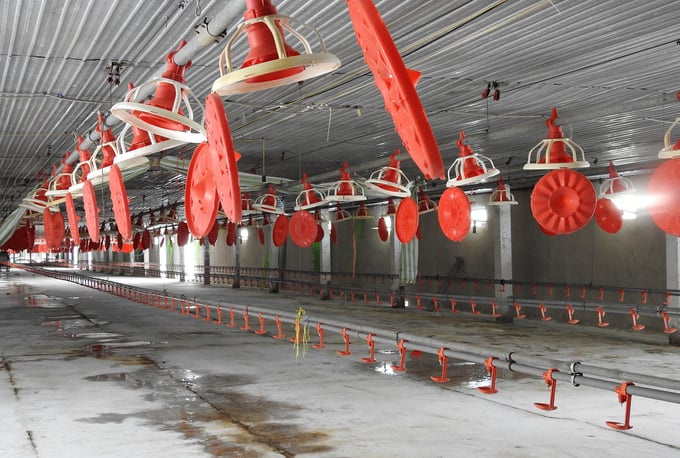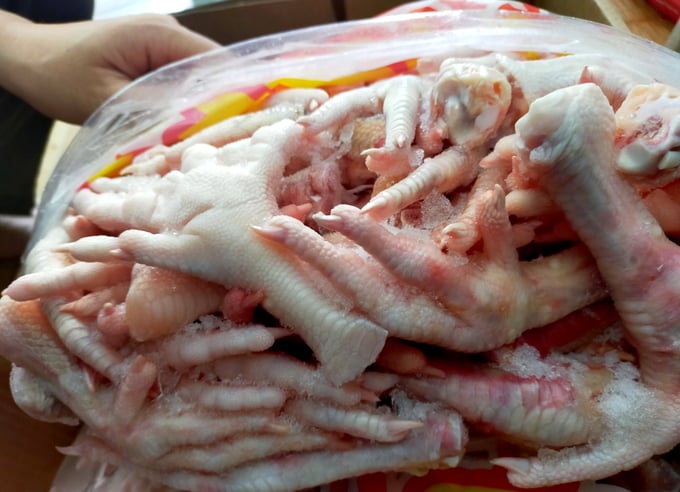June 19, 2025 | 06:41 GMT +7
June 19, 2025 | 06:41 GMT +7
Hotline: 0913.378.918
June 19, 2025 | 06:41 GMT +7
Hotline: 0913.378.918

Due to low chicken prices, a large chicken farm in Dong Nai had to be closed earlier this year. Photo: Son Trang.
The Vietnam Poultry Association (VIPA) has just sent an official dispatch to the Prime Minister, the National Assembly Standing Committee, and relevant ministries and agencies, proposing some solutions to remove difficulties for the poultry industry.
According to Mr. Nguyen Thanh Son, President of VIPA, over the past time, illegal transportation and trade of poultry and poultry products across the border into Vietnam have continued to be complicated in localities sharing the same border with countries, especially in the central and southern provinces.
Incomplete statistics of VIPA show that tens of thousands of tons of discarded live chickens are smuggled across the border into our country every month.
This is not only one of the reasons for the increased risk of infection with highly pathogenic avian influenza viruses and other dangerous infectious diseases in Vietnam, but also seriously affects the domestic livestock industry.
Faced with the increasing situation of smuggled poultry and poultry products, on May 4, 2023, the Ministry of Agriculture and Rural Development sent a document to the Ministry of Public Security, the Ministry of National Defense, and localities, proposing to strengthen measures to prevent, detect and strictly handle cases of illegal transportation of poultry, poultry products across the border and livestock products temporarily imported for re-export into Vietnam.
However, so that the above situation does not happen again after each end of the campaign of ministries, branches, and localities, VIPA proposed that the Ministry of Agriculture and Rural Development coordinate with the Ministry of Public Security, the Ministry of National Defense, and localities to regularly Regularly and continuously organize inspection, control, prevent and strictly handle organizations and individuals that illegally transport and trade in poultry and poultry products across the border.
In addition to smuggling, also in the past time, there were many poultry by-products with meager prices, such as legs, heads, necks, wings, skin, and gizzards, especially laying hens that have been frozen with their heads removed, removing legs and offal (this type of chicken is mostly not used in developed countries as food for humans) is still imported in vast quantities to the Vietnamese market for food for people.

Cheap imported chicken feet sold in Ho Chi Minh City HCM. Photo: Son Trang.
On the other hand, there is a paradox that while Vietnam banned the use of Ractopamine, Cysteamine as growth stimulants and lean animals (160 countries around the world also had similar bans), annually, large amounts of pork, beef, and chicken from some countries are allowed to use the above two substances for livestock and poultry are still imported into Vietnam.
Meanwhile, Vietnamese enterprises have to face many strict technical barriers from importing countries to export livestock products, making our country's livestock products weak and disadvantaged in the domestic market.
According to data from the General Department of Customs, in the last 5 years, the annual volume of imported chicken meat has increased continuously, accounting for 20-25% of our country's total chicken meat consumed.
VIPA said that if the above conditions are not controlled, domestic poultry production will become more and more complex, and it may also have consequences for the health of Vietnamese consumers.
Therefore, to create a healthy and fair competitive environment for domestic businesses and breeders, especially without creating a risk of adversely affecting consumers' health, VIPA proposes that the Government promulgate a document banning the import of meat products from countries that use growth stimulants Ractopamine and Cysteamine.
Also, VIPA proposed the Ministry of Agriculture and Rural Development and relevant ministries and branches immediately implement non-tariff measures to protect poultry production and consumer health.
Accordingly, soon build technical barriers reasonably and in line with international practices (can refer to the experience of Thailand and some countries in the region) to limit the trade deficit of poultry and poultry products like last time.
According to the Ministry of Agriculture and Rural Development, through reflections from media agencies and people, the situation of illegal transportation and trade of poultry and poultry products across the border into Vietnam continues to take place common and complicated in localities sharing borders with other countries, especially in the central and southern provinces.
This may be one of the reasons for the increased risk of highly pathogenic avian influenza viruses and other dangerous infectious diseases entering Vietnam from abroad and spreading to other localities, seriously affecting the domestic poultry industry and people's health.
Translated by Ha Phuc

(VAN) To address plastic pollution, closing the plastic recycling cycle will bring significant economic and environmental benefits.

(VAN) According to the Binh Thuan Department of Industry and Trade, in the first five months of 2025, Binh Thuan's dragon fruit export turnover increased by 20.65% compared to the same period last year.

(VAN) EU countries on Thursday gave final approval to new tariffs on fertilizer imports from Russia, a move aimed at cutting off revenue that could support Moscow’s war in Ukraine, despite concerns from European farmers.

(VAN) The working delegation from the Ministry of Agriculture and Environment conducted an important trip to the Netherlands to strengthen strategic partnerships and sustainable development in the agricultural sector.

(VAN) The letter ‘A Plea from the Ocean’ not only evokes emotion but also awakens the human conscience to the responsibility of protecting life on Earth.

(VAN) The Department of Agriculture in South Africa has announced the country’s first mass vaccination of poultry to prevent local birds from contracting avian influenza.

(VAN) Establishment of the Mekong Delta Regional Agricultural Linkage Center, aiming for a closed value chain, deep processing, trading platforms, and international market connectivity.